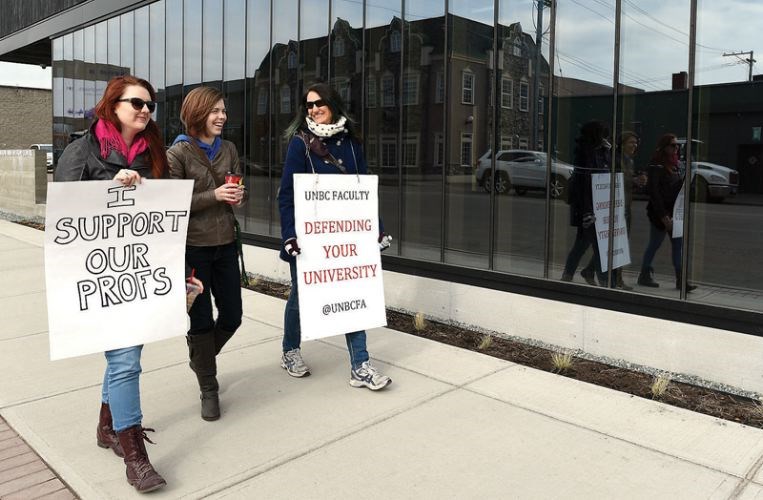The University of Northern B.C. has a first collective agreement after binding arbitration gave faculty a 10 per cent wage increase over the course of the five-year contract.
That's 0.5 per cent more than the university had put on the table in its final offer.
Throughout the dispute, UNBC acknowledged the compensation gap compared to other universities, but said it must comply with the province's economic mandate and offered a five-year deal totaling 5.5 per cent. It later topped it up to 9.5 per cent by adding "Enhanced Career Development" increments to close the gap for some.
The university wanted those increments to be merit based, but the arbitrator opted for a raise across the board.
UNBC released the 53-page decision by Stanley Lanyon on Thursday afternoon after the two sides made their case before the arbitrator in late November.
"We're quite pleased that the arbitrator has come back so soon," said Dan Ryan, UNBC's acting vice president academic and provost, calling the amount a "baseline" to move ahead.
"We're happy to move forward with it, accept the decision and we're going to spend the time to work with the Faculty Association and other groups to ensure we can build positive, constructive relationships going forward."
The faculty association said it was "deeply disappointed" with the agreement, which is backdated from July 1, 2014 to June 30, 2019. While Lanyon said the additional 4.5 per cent could be seen as a way to "catch up," UNBC's faculty said his decision failed to address "structural problems" with compensation.
"We're disappointed that everybody is acknowledging there is a problem here... And yet nobody's willing to do anything about it," said Stephen Rader, association president.
"I think what perhaps isn't getting across well enough is this isn't really about our compensation right now. This is about building UNBC's success in years to come... If we're offering some of the lowest salaries in Canada, that makes it really hard to build for the future success of the university."
In its submission, the faculty association showed that its assistant, associate and full professors make between 70 and 75 per cent of the salaries expected at other B.C. Research universities. At the mid-range that rises to about 80 per cent among national comparators.
"If we're the employer of last resort for Canadian faculty members, that is not the way to build a strong institution for the future," Rader said.
Thursday's announcement is the culmination of a long-running dispute, including mediation, arbitration and a two-week strike in March. The Labour Relations Board's mediator ordered binding arbitration after being called in by the university through a process only permitted for first collective agreements.
Ryan characterized the decision as a compromise and while Rader disagreed, he said there were some positives for faculty.
"There was no change in the promotion and tenure system in place," Rader said.
"The university had wanted to change that quite a bit so we're happy he decided not to change that, and also enhanced the medical services travel fund benefit."
Both sides expressed a desire to work together. Within six months, UNBC is tasked with striking a committee on post-retirement benefits and compensation.
"Now we have a mechanism to look at that. I'm very hopeful that that committee will be able to do some good work and look at what we need to do to fix the problems... I think that's a win for everybody," said Rader, adding it will take work to mend relations.
"It's difficult because the environment has become highly polarized."
Rader said the problem still remains with the gap in the annual increases. In its submission, the faculty showed that average increment is set at $1,111 for the last year compared to more than $2,600 at unionized national comparators.
Lanyon opted to work within a provincial context and rejected faculty's proposed salary grid, noting they do not exist in B.C. research universities. The university had said the faculty's proposal would cost $14.5 million, a number the union disputed.
While the faculty has argued all along that UNBC has the funds to offer more generous increases, Lanyon characterized the past two year's $4.2 million in surplus as "non-recurring" and seemed swayed by the declining enrollment and decrease in provincial operating grants.
"(T)here has been a decline in the university's two primary revenue sources," Lanyon wrote.
The university had estimated a 9.5 per cent increase would cost the institution about $4.5 million and Ryan said it was too early to say what the 10 per cent would cost.
Lanyon said a five-year agreement offers stability and time for the two sides to move conversations outside of "adversarial bargaining" – a sentiment Ryan echoed.
"I think it's an opportunity to put this stage behind us and begin to sit down with the association and begin to develop those constructive relationships because that's how we're going to move forward and I think it's what the university needs and deserves and same with community," Ryan said.



